A Review of AFROPUNK FEST 2013 [Brooklyn]
Devon Tincknell attends the 2013 AfroPunk festival, examining the AfroPunk movement and the concepts of where culture, race, and art intersect
AfroPunk Fest 2013
Commodore Barry park
Brooklyn, NY
Saturday, August 24th
I used to own a lot of VHS tapes and there was this one trailer for a movie called Zebra Head that I, somehow, saw more than a few times. I don’t know if it was on multiple tapes, or just on something like Brian Bosworth‘s Stone Cold that I watched many, many times, but either way, I saw this trailer a lot. “Presented” by Oliver Stone, the movie looked like some sort of early-nineties Spike Lee rip-off starring Michael Rappaport as a white guy obsessed with black culture–pretty prescient considering that Rappaport made a documentary about A Tribe Called Quest, 20 years later. I’ve still never seen Zebra Head, but there was one line from the trailer that always stuck with me, when a girl turns to the token black power guy in her class and says, “Everything with you is race,” to which he responds, “That’s right, everything IS race.”
Attending the ninth annual AfroPunk Fest in Brooklyn‘s Commodore Barry Park, I kept thinking about that line: “Everything IS race.” I’m white. The last few places that I lived were suburban Massachusetts (extremely white), Olympia, Washington (also, very white), and then, Austin, Texas (fairly white and definitely segregated), before I moved to Brooklyn, a month ago. My home is now in a heavily Dominican part of Bushwick, where I am, for the perhaps the first time in my life, a minority. So, I hope you’ll forgive me if, when suddenly surrounded by a music festival celebrating, not only black culture, but “afropunk“–an oddity that refutes the stereotypes and hip-hop monoculture that the media promotes, so relentlessly, as the sole African-American identity–that the question of race was at the forefront of my mind.
While there were certainly rap acts performing at the festival, there were also booths selling Malcolm X tote bags, which I doubt is something that you’d find at any Lil Wayne concert. There were also little kids, which was a change from the more white, hipster-y festivals that I attended in Austin. One of those little kids even had his afro picked with a black power fist comb, which was awesome. So, feeling like a stranger in a strange land, immersed in the temporary epicenter of the “afropunk” movement, was I–a white journalist–supposed to think about race, or ignore it? As a liberal who voted for Obama in 2008 and 2012, am I supposed to not “see color” and just write about the music? Or, is that some privileged bullshit that just masks ignorance with naive assumptions? IS everything race? Does the fact that I took a History of Black Power course in college–and was told that I looked like Rick Rubin by the professor–give me any sort of authority? Then again, what authority does any journalist covering a music festival for an online outlet really have?
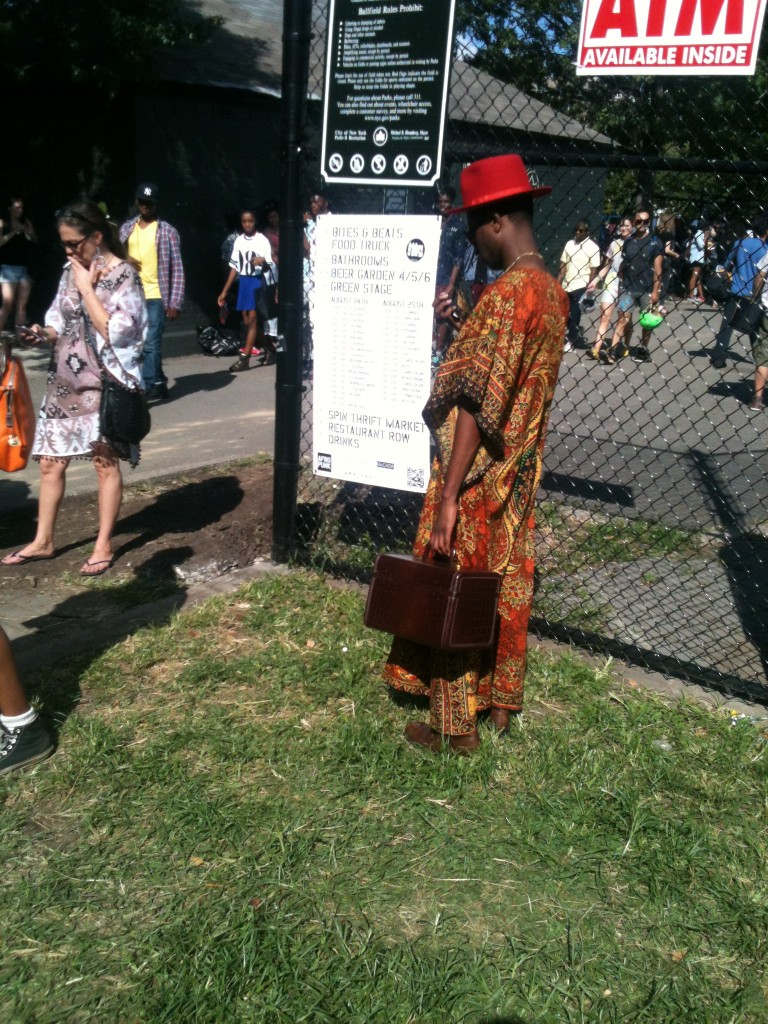
Pulling back from that navel-gazing dissertation on white privilege for a moment, let’s talk about the AfroPunk Fest 2013 edition. Taking place in the sun-drenched, but cool, fields of Commodore Barry Park, the festival was refreshingly relaxed and low-key. I’ve never been one for the massive mega-fests, where you can pay $300 to see Animal Collective from across two football fields and then have $9 Rolling Rocks spilled on you, while the Red Hot Chili Peps play the crappy songs that they wrote after John Frusciante kicked heroin. Just not my scene. But, AfroPunk I could do. With only two stages–confusingly labeled “red” and “green,” although both stages were actually just black–and the rest of the park devoted to food trailers selling lamb curry and random stuff like a rock climbing wall, the festival made it feel like you were just hanging out in a park on a Saturday, rather than battling the crowds and elements in pursuit of that mythic “live music experience.”
My girlfriend and I got there around 3p.m. It was just after Jean Grae had finished, who was one of the few acts on the Saturday bill that I’d heard of before YouTubing bands that morning in preparation. We briefly checked out Rebelmatic, who sounded sort of like the Suicidal Tendencies songs that aren’t “Institutionalized,” but did feature a lot of dreadlock whipping head banging, so there’s that. Since I didn’t know much about any of the non-headlining bands other than the one or two YouTube videos I’d seen, we sort of meandered around, checking out the aforementioned Malcolm X bags and “Kiss Me I’m African” shirts, neither of which I purchased.
After watching a couple minutes of The London Souls, whose earlier YouTube search revealed that they play festivals like Mountain Jam and do a funky rock thing that occasionally dips into Wolfmother-like riffage and extended jams, we went to the other black stage (the red stage?) to check out Rye Rye, who a friend recommended., but who I still know nothing about, because she never played. Instead, a DJ continuously warmed up the crowd, which turned out to be kind of awesome. Now, I can’t say whether this is a “black” thing, or an afropunk thing, or a Brooklyn thing, but unlike a lot of the Austin festivals I’ve attended, this crowd actually danced. Without an artist on stage, even. Like a fight in high school, the crowd would spontaneously gather around a group of dancers, while everyone else whipped out their phones and stood on their tippy toes to see what was happening.
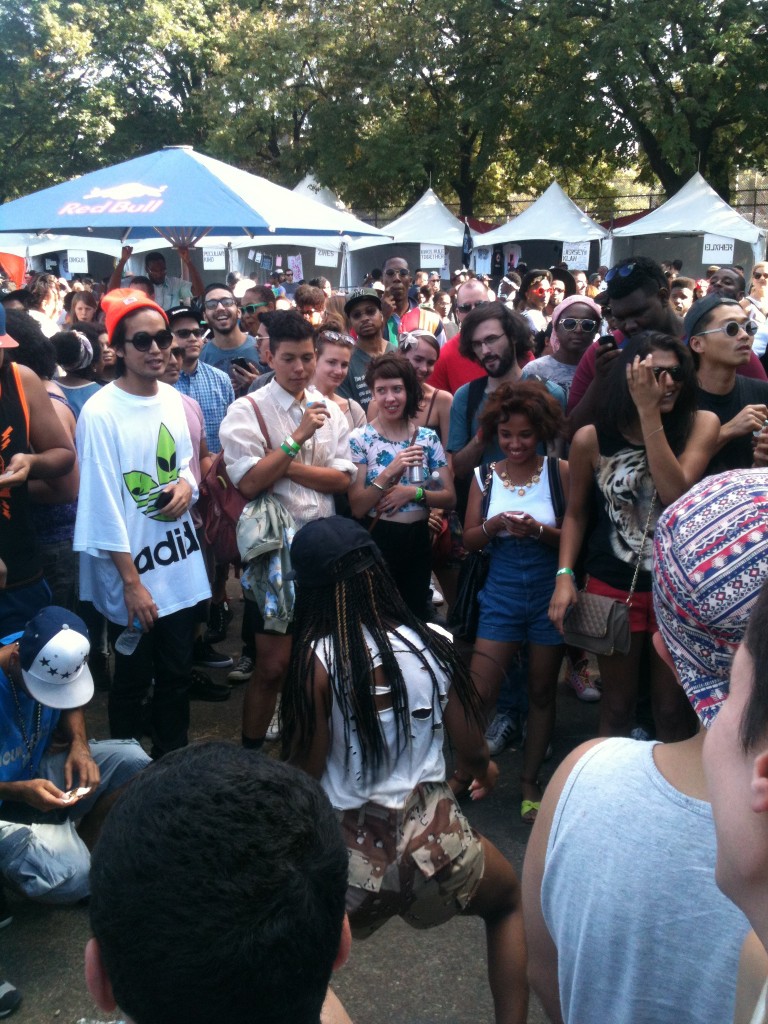
At one point, a group near the front got particularly inspired and began dancing around a guy in a wheelchair. He seemed to be developmentally disabled in some way, but was clearly having an awesome time rocking out, while the mob did the same around him. The same segment of the crowd then lifted a child (middle school aged? I have no idea how old children are) into the air where he proceeded to give everyone two middle fingers, having a grand ole time. The air reeked of pot–one hitters could be seen sparking up every which way–and I saw a black person with an Aquabats patch on, which I think might be one of the first times that’s ever happened. For there being no artist on stage, this was still a crowd that was willing to party.
At this point, I was kinda like, “Where’s this Rye Rye character? Why isn’t the music starting on time? Why isn’t anyone passing me a joint?” But, then again, I didn’t really care, because the band that I really wanted to see was about to play on the other black stage (green stage?), anyway. You might have seen the video pop up on your Facebook feed, either titled “Unlocking the Truth – Brutal Breakdown,” or “The Insane Things These Middle Schoolers Are Doing That You Won’t Be Able To Believe” (if the link fed back to Upworthy). Either way, a trio of 11year-olds played some kick ass instru-metal out in front of a subway and became an overnight sensation. Since black middle schoolers playing metal really well is an irresistible hook, Unlocking the Truth have since booked gigs on shows like Totally Biased and festivals like Afropunk.
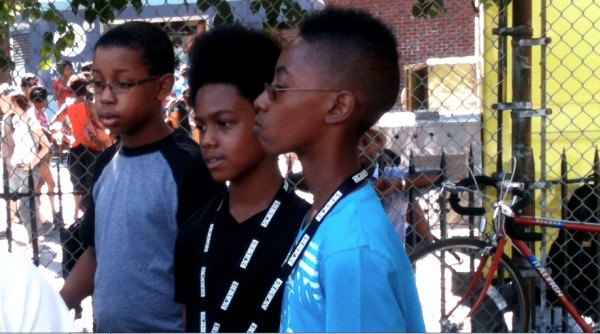
Not going to lie, watching these kids shred is awesome. They’re adorable, they’re young, and they know how to work the crowd with sweet head banging and posturing. Do I really want to watch or listen to somewhat repetitive metal breakdowns for very long? Not really. Would I like this band if they weren’t born after the first iPod dropped? Maybe? Sorta. Either way, they are incredibly young and they do shred disproportionately hard, so that’s great. Seeing them backstage with their moms was also awesome and it seems like their parents are doing a good job of chaperoning them through the fickle world of Internet hype, but then again, I don’t really know. I was just drinking free Red Bull and saw one of them asking permission to do something from a lady that looked like a mom. Maybe she wasn’t.
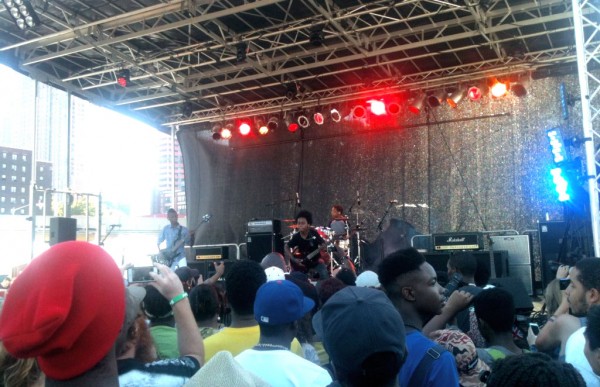
Following Unlocking the Truth was celebrity vanity project Wicked Wisdom, featuring Jada Pinkett-Smith and some other musicians that I can’t be bothered to Google, because I don’t care. I heard Wicked Wisdom from afar, because I realized that the chances of it being an entertaining trainwreck were not as good as the chances of it just being a sucky band playing to a mildly-interested-in-seeing-Jada-Pinkett-Smith audience. Instead, I went over to the other stage (red, green, blue? I don’t know they were all black!) to watch Le1f (pronounced “leaf”) whose video for “Wut“ was perhaps the best one I’d watched that morning.
Appropriately enough, Le1f started with “Wut,” but made the mistake of assuming that the crowd was intimately familiar with his one sorta hit. After the audience failed to appropriately call back the chorus to his out-held mic (something about “wut is the wut?”), Le1f questioned whether they could hear him, or not. Perhaps there were technical issues? He then restarted the song, this time no longer relying on crowdsourcing to provide the hook. After a few more songs, I realized that I didn’t know anything about this guy and, while I’m sure he’s very nice and popular, I had to grab a train into the city to catch an improv show (remember the beginning of the article? I’m white).
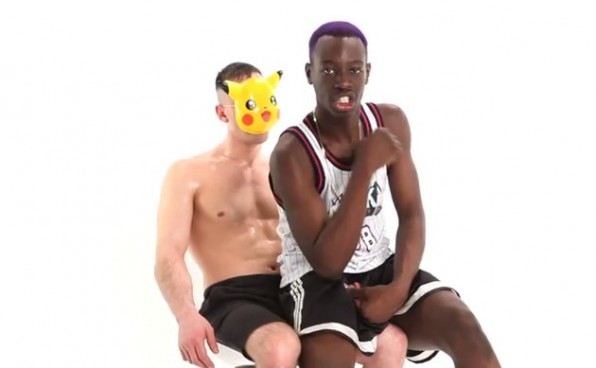
This sucks, because I would have loved to have seen Saul Williams, not to mention some of Sunday‘s acts like Death and Chuck D. But, while Chuck D performing Fear of a Black Planet (with some DJ that I’ve never heard of who is not Terminator X) sounds awesome in theory, I realized that it’s not 1992. A lot of the festivals really seem to milk the marquee name nostalgia thing, these days. How could you not want to see Biz Markie? But, then again, how many Biz Markie songs can you really name?
I watched this problem unfold a few years ago at Austin‘s Fun Fun Fun Fest when Slick Rick performed. He’s Slick Rick “The Ruler,” he’s got an eye patch, we’ve heard of him; we know that “Treat her like a prostitute” song, this is going to be great. But really, Rick is a washed-up rapper from the late-eighties who hasn’t been relevant in quite some time. He’s not a masterful performer like the Chili Peps who makes millions of dollars touring every year with a tight, entertaining act. He’s just a name that you recognize. And he was a performer that disappointed.
I would put Chuck D on a different level than Slick Rick, absolutely., but I also suffer from a genetic knee condition called PVNS (pigmented villonodular synovitis,) which basically makes my left knee swell up and get sore if I stand around in a field for too long. So, although I did want to see Danny Brown, The Coup, Big Freedia, and some of the other Sunday acts, I decided that I didn’t want to stand around in a field anymore, or even a nice park.
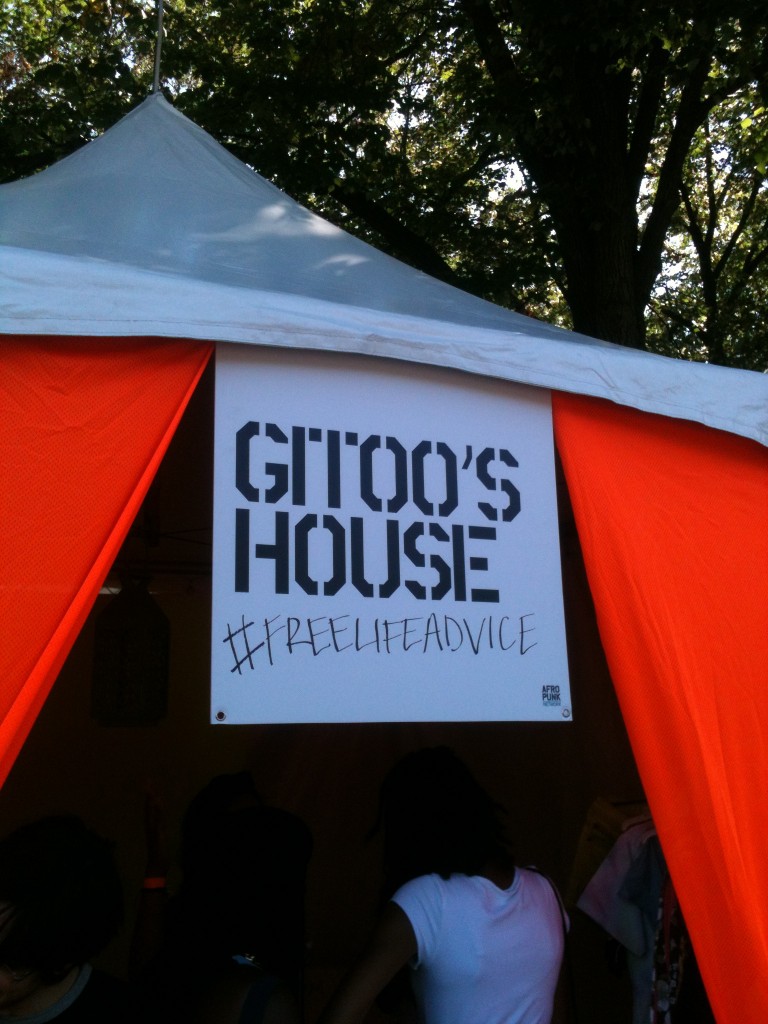
Afropunk, as a concept, is great. It imagines a world where Bad Brains inspired just as many angry black youths as Minor Threat lit up the imaginations of disaffected, suburban Caucasians. It’s a scene that embraces disparate elements of black culture, combining consciousness with good times and rap with rock and roll, while leaving out Anthrax and Aerosmith. For a recent movement, spawned out of a 2003 documentary of the same name, it’s even more impressive. It pulled fringe individuals from a fringe movement into a cohesive mass and created something that is about music, fun, anger, individuality, self-expression, and race.
Is everything about race? As a white person, I can’t really answer that. As a teenager, I looked and acted like an angry punk, but at a certain point, I was able to shave my mohawk and hang up my spiked leather jacket. No one was simply “black in high school.” But the great thing about the AfroPunk Fest is that, while it is about race, it isn’t all about race. It’s like Brooklyn as a whole, it’s a mighty cultural melting pot that takes a little bit of everything and produces something that’s totally awesome–provided you don’t stick around to watch Wicked Wisdom.
